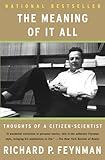
Available at Amazon Check Price Now!
The Meaning Of It All: Thoughts Of A Citizen-scientist (Helix Books)
 |
Customer Rating : 
Availibility : Usually ships in 1-2 business days 
|
The Meaning Of It All: Thoughts Of A Citizen-scientist (Helix Books) Overviews
Many appreciate Richard P. Feynman's contributions to twentieth-century physics, but few realize how engaged he was with the world around him-how deeply and thoughtfully he considered the religious, political, and social issues of his day. Now a wonderful book-based on a previously unpublished, three-part public lecture he gave at the University of Washington in 1963-shows us this other side of Feynman, as he expounds on the inherent conflict between science and religion, on people's distrust of politicians, and on our universal fascination with flying saucers, faith healing, and mental telepathy.
The Meaning Of It All: Thoughts Of A Citizen-scientist (Helix Books) RelateItems
- The Pleasure of Finding Things Out: The Best Short Works of Richard P. Feynman (Helix Books)
- What Do You Care What Other People Think?: Further Adventures of a Curious Character
- Perfectly Reasonable Deviations from the Beaten Track
- Six Easy Pieces: Essentials of Physics By Its Most Brilliant Teacher
- Six Not-So-Easy Pieces: Einstein's Relativity, Symmetry, And Space-Time
The Meaning Of It All: Thoughts Of A Citizen-scientist (Helix Books) Specifications
In this series of lectures originally given in 1963, which remained unpublished during Richard Feynman's lifetime, the Nobel-winning physicist thinks aloud on several "meta"--questions of science. What is the nature of the tension between science and religious faith? Why does uncertainty play such a crucial role in the scientific imagination? Is this really a scientific age?
Marked by Feynman's characteristic combination of rationality and humor, these lectures provide an intimate glimpse at the man behind the legend. "In case you are beginning to believe," he says at the start of his final lecture, "that some of the things I said before are true because I am a scientist and according to the brochure that you get I won some awards and so forth, instead of your looking at the ideas themselves and judging them directly...I will get rid of that tonight. I dedicate this lecture to showing what ridiculous conclusions and rare statements such a man as myself can make." Rare, perhaps. Irreverent, sure. But ridiculous? Not even close.
The Meaning Of It All: Thoughts Of A Citizen-scientist (Helix Books) CustomerReview
Now and again a gem comes from a book and this is one of the classics of American literature, on the basis of common sense, intelligence and a reasonable way to resolve the unknown.
"All other aspects and characteristics of science can be understood directly when we realize that the observation is the ultimate and final judge of the truth of an idea," says Feynman. Instead of pulling out the demon of belly or an ideology, sought meaning from Feynmandirect observation. This is a rare quality and revolutionary, especially at a time, as are most of the ideas of the performance of any conservative or liberal bias base. Feynman was a master of close observation, rather than ideology carefree.
Okay, so much for his resume. An essential quality of this book comes from three conferences held in a refined setting. Instead of a thousand pages, a 'idea, education, a presentation will be limited to the essential facts about the ability of the baseto sit comfortably and dozing behind the human mind not having a nap. This is not Cuba, where the faithful endure hours and hours of contemporary drone, is America, where the speakers are dull quick, bright and ready to break in time for a cup of coffee or trivial.
Feynman destroys the rigid ideologies of politics and religion, without attacking or he describes religion as an essential quality of human experience, but remains farthe requirement of faith is not based on facts observed. Even then, he recalls how observations change with new discoveries.
Most valuable experience for him, life was possible because of continuous learning. His tone is conversational, not pedantic, it is a wise teacher talk comfortably average listener, not an abstruse scholars to discuss the arcane theories among his colleagues. Think of Abraham Lincoln democracy as "the people described by the people, forpeople. . . "Compare the hundreds of pages of Alexis de Tocqueville to describe" Democracy in America "and capsulize the possibility for some of the few people to just understand the heart of a problem. This explains why a politician can not honestly to be successful, but a good scientist is always a pleasure.
In terms of every day, does not need to talk Feynam "of science, science for science." Looks better, explains how you can develop a similar rational approach to life onthe basis of "all scientific knowledge is uncertain."
He says instead of the rigid orthodoxy and ideology, Feynman, "If you look at the situation or not want, in a new direction, if we did not have a doubt or recognize ignorance, we do not get any new ideas. It would be worth nothing because we want to know what is true. "
This is a rare quality. Most people do not like to think, but rather the principles hoary Harry Potter. It is not a book for the complacentpleased with himself, or religious fanatics, is the pursuit of knowledge, which are not safe. The scientific method provides the insight to recognize the "If you're not sure you have the opportunity to improve the situation."
This book is priceless and worth of a substance at low cost. It is fortunate, is revisited, and it is a pleasure that so many have rated as good.
*** Product Information and Prices Stored:Feb 21, 2010 14:37:15